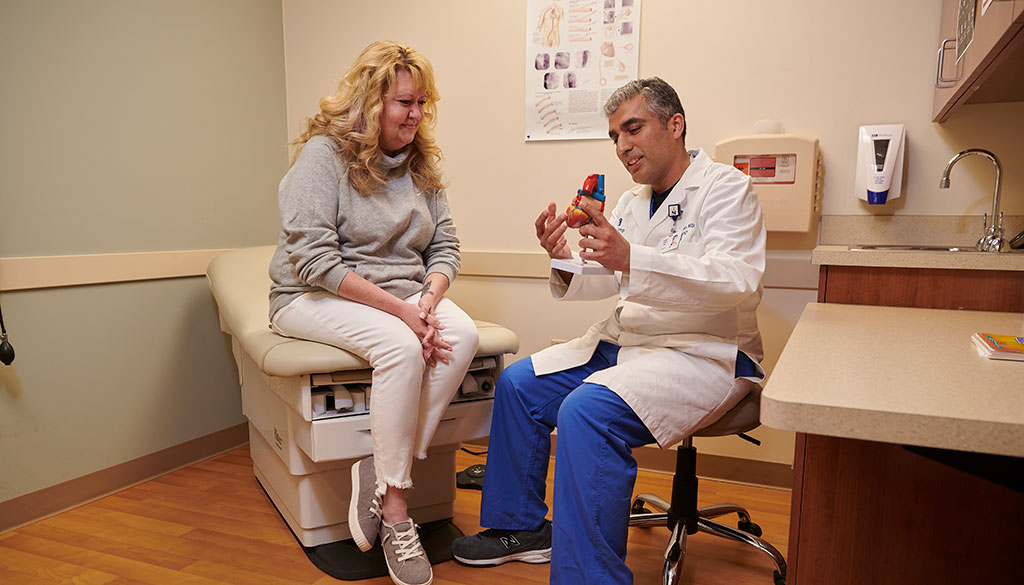Comprehensive Heart Care, Unmatched Expertise

Why choose BJC HealthCare for heart care?
We are here when your heart needs us. Together with WashU Medicine physicians, BJC Medical Group, and providers in the region, we deliver comprehensive heart care you can trust. Whether you’re focused on prevention, managing a heart condition, or facing complex health challenges, our team includes nationally recognized cardiologists and heart specialists who develop a care plan tailored to your unique needs, medical history, and well-being.
Expertise and experience
From routine checkups to complex procedures, heart experts at BJC HealthCare and WashU Medicine ensure the right care at the right time. You’ll have access to leading-edge treatments, the latest technology, and experienced specialists who perform some of the most advanced heart procedures in the country.
With more than 30 cardiology offices across the region, BJC HealthCare and WashU Medicine bring nationally recognized heart care close to home, delivered with compassionate support, and a team dedicated to help you live your healthiest life.
To schedule an appointment, call 314-273-2315 or fill out a contact form, and we’ll connect you to a heart specialist.

Take the heart health quiz
Answer questions about your heart health to understand your risks for heart disease.
Know when to see a cardiologist
Cardiologists specialize in the prevention, diagnosis, and treatment of heart disease and manage a wide range of conditions.
Factors that can increase your chance of heart disease:
- High blood pressure
- High cholesterol
- Family history of heart disease
- Smoking or tobacco use
- Diabetes
- Not getting enough exercise
- Diet high in fat and salt
- Excessive alcohol use
Hear from our patients
Patient story

Every Second Counts: How an AED Saved a Grandfather on the Pickleball Court
Mike Mueller, 61, from Swansea, Illinois, had multiple heart tests done a few years ago and was free of any blockage. However, blockage can occur quickly. He recently started feeling pressure in his chest but didn’t believe it could be his heart.
PATIENT STORY

Full-Court Press for Two Hospitals: Coach Koch’s Fight for the Health of His Heart
Gary: An early riser, Gary woke up on a July morning with an unusual sensation—like warmth spreading through his blood. Feeling dizzy, he went to sit in his chair and felt a strange sensation in his chest.
Patient story

A Heart for Life: How One Woman’s Transplant Journey Came Full-Circle at Barnes-Jewish Hospital
Something was different about Ashley’s heart, but physicians didn’t quite know what. Answers finally came when Ashley was 4 and doctors diagnosed her with restrictive cardiomyopathy, a heart condition in which the heart muscle is too stiff to pump blood properly.
What to expect during your first visit to a cardiologist
Visiting a cardiologist can feel intimidating, especially if it’s your first time. With BJC HealthCare and WashU Medicine, you have access to nationally recognized heart experts who listen, answer your questions, and help you feel comfortable and confident in your care. Understanding your heart health, and taking early steps to address potential concerns, can help you stay healthy and keep doing the things you love. Preparing ahead for your visit helps you make the most of your time with your cardiologist.
How to prepare for your visit
- Bring a list of current medications. Include all prescriptions, over-the-counter medications, vitamins, and supplements.
- Note your heart-related symptoms. Write down any symptoms you’ve experienced, when they occurred, and what you were doing at the time.
- Share your family medical history. Family history offers valuable insight, especially if your parents, siblings, or grandparents have high cholesterol, diabetes, heart disease, or high blood pressure.
- Discuss your medical history. Include previous surgeries, medical procedures, and any past cardiac test results.
- Be ready for additional testing. Your cardiologist may recommend further testing such as a stress test or echocardiogram, to better understand your heart health.
Questions to ask your cardiologist
- What lifestyle changes should I make to improve my heart health?
- Will my medication have any side effects I should watch for?
- Should I make any changes to my daily activities or exercise routine?
- What warning signs should I watch for that may indicate my condition is worsening?
- How might my condition progress over time?
How your heart works
Request a Consultation
To schedule an appointment, call 314-273-2315 or fill out the form below and we will connect you with a heart specialist that fits your unique needs.